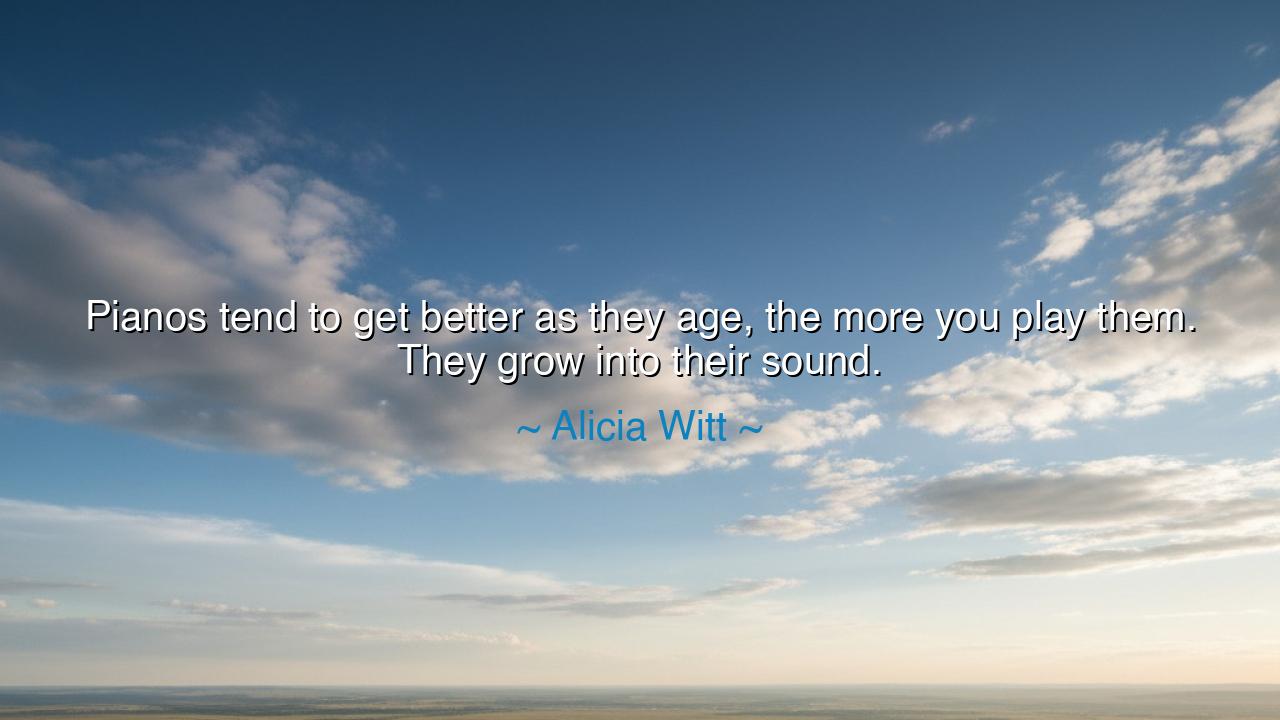
Pianos tend to get better as they age, the more you play them.
Pianos tend to get better as they age, the more you play them. They grow into their sound.






When the musician and actress Alicia Witt said, “Pianos tend to get better as they age, the more you play them. They grow into their sound,” she was not merely speaking of instruments, but of life itself. Beneath her words lies a wisdom that the ancients would have cherished — that time, when met with devotion and use, does not diminish beauty; it deepens it. The piano, with its wood and wire, is but a mirror for the human soul: it responds to touch, to persistence, to love. Through years of practice, of joy and sorrow, its voice becomes warmer, richer, more alive. So too does the spirit of a person who lives with purpose, who endures and creates, who learns to let time refine rather than erode them.
The piano, when first born, is like a young mind — bright but uncertain, capable but untested. Its tone is pure but incomplete, its resonance waiting to be awakened. Only through the repetition of hands upon its keys, through the daily offering of music, does the instrument begin to remember. The wood absorbs the sound, the hammers soften, the strings settle. The instrument learns its owner’s soul. Each note leaves an imprint, and over time, those countless imprints form a harmony that could never be achieved in youth alone. In the same way, we too “grow into our sound.” Every hardship, every triumph, every act of persistence shapes the timbre of our being.
This truth is echoed in the lives of artists, saints, and thinkers throughout history. Consider Beethoven, who in his youth played with dazzling precision but in his later years, deaf and broken, reached into the deepest wells of the human heart. His Late Quartets — written when he could no longer hear a single note — possess a beauty that seems almost divine, as though time itself had tempered his soul like steel in fire. Beethoven, like Alicia Witt’s piano, grew into his sound through suffering and perseverance. His art aged not by fading, but by ripening — proof that the years do not steal power from the true artist, but distill it.
Witt’s metaphor also carries a deeper spiritual resonance. To say that the piano “gets better as it ages” is to defy the fear of decline that so often shadows human life. We are taught to dread aging, to believe that the best of us belongs to the past. But here, in this simple image, is redemption: what if age is not loss, but refinement? What if, like the piano, we too become more harmonious, more expressive, more truthful the longer we are played by the hands of experience? The sound of the soul, like the sound of an old instrument, becomes richer not in spite of its years, but because of them.
And yet, the piano must be played to reach such grace. A piano locked away, untouched, gathers dust and loses resonance. Its strings stiffen, its soundboard forgets how to sing. So it is with people who withdraw from life, who refuse to act, to risk, to create. We must allow ourselves to be played — by time, by love, by challenge — if we are to find the music that lies dormant within us. The wear of use does not destroy us; it completes us. The marks of struggle and effort, like the worn ivory keys of a piano, are signs of a life well-lived.
There is a story of a Japanese craftsman who repaired broken pottery with veins of gold, a practice called kintsugi. He believed that cracks were not flaws to hide, but features to celebrate — for they showed where the object had lived, where it had been touched by time. A piano that has been played for decades carries the same golden scars in its tone: a resonance that no untouched instrument can ever achieve. This is the wisdom of Witt’s saying — that the passage of time, when embraced with purpose, transforms imperfection into beauty.
So, O seeker of harmony, take this lesson to heart. Do not fear the passing years, nor seek to remain forever new. Instead, live as the piano lives: in motion, in music, in constant dialogue with time. Let the hands of life play upon you; let each moment leave its tone within your spirit. The sound you make today will not be the sound you make tomorrow — and that is the gift of growth.
Thus, the teaching endures: we grow better by being used, wiser by being tried, and more beautiful by being played. The years are not our enemies; they are our collaborators. Like the piano, may your soul, too, grow into its sound — deep, resonant, and unforgettably human.






AAdministratorAdministrator
Welcome, honored guests. Please leave a comment, we will respond soon